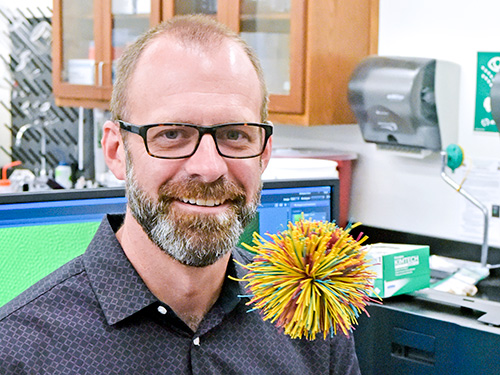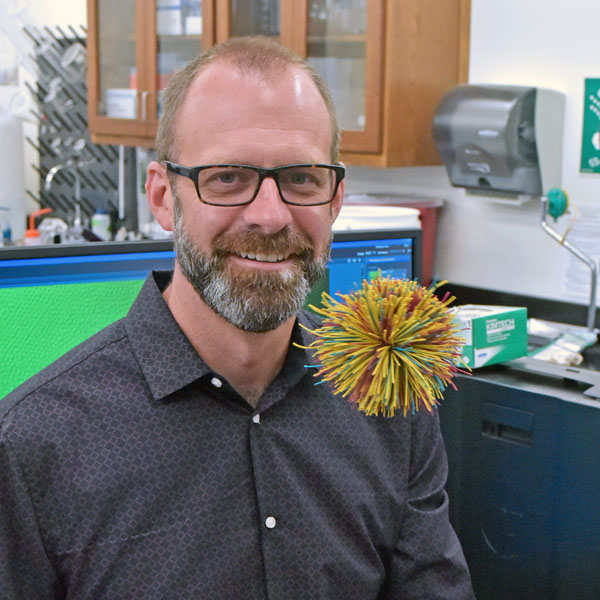Featured Customer: Andrew Lyon, Ph.D.

Please tell us about your background: where you grew up, studied and the field you chose
I grew up in New Jersey, and am the youngest of 5 siblings. My older sister, Kathleen, and an older brother, Mike, were both chemistry majors at Rutgers, which obviously impacted me greatly since that is where I went to pursue my own undergraduate degree in Chemistry. From there, I went to Northwestern for a Ph.D. in Physical Chemistry, followed by a postdoctoral stint at Penn State. Throughout all of those stages, I was always fascinated by the fundamental underpinnings of how materials functioned, which has meant that even the most applied projects we work on have a firm foundation in physical chemistry.
What led you to choose that field? What are the challenges that excite you?
I was initially hooked on chemistry because there was a (naïve) thrill and fascination associated with synthesizing molecules and materials that had never been made before. As I have moved forward in my career, I have become more connected to challenges that couple that “newness” of molecular structures with translation to a demonstrated need. Much of our current work is more applied in nature, which satisfies my desire to see our work used by others in a practical fashion.
What does your current position entail? How does it tie into your previous experience, and where is it going?
I am currently the Dean of the Schmid College of Science and Technology at Chapman University. I joke that my job description is essentially “highly efficient generator of email." In actuality, my main function, as I see it, is to lower the barriers to student, staff, and faculty success. So, I spend a lot of my time trying to figure out how to make the operational, educational, and research missions of my college more efficient and effective. I take great joy in this, since I am able (I hope) to make impacts that go far beyond those of my own laboratory and classroom activities.
At Chapman, I have been involved in two massive projects recently. First, we just moved my college into the new 140,000 square foot Keck Center for Science and Engineering. I have learned an amazing number of things in helping to design, program, and (finally) occupy this amazing building. Secondly, we are in the initial stages of launching the Dale E. and Sarah Ann Fowler School of Engineering. Helping to envision an entirely new engineering school has been fascinating and exciting – I look forward to seeing that school launch in 2020. On top of all of this, I still do research on the topic of soft materials for regenerative medicine applications, but I sadly spend far less time on research than I did at my former university, Georgia Tech.
In what context did you first learn about light scattering and Wyatt instruments?
When I first started at Georgia Tech in 1999, I was relatively new to polymer science and hadn’t been exposed to light scattering as a macromolecular characterization tool. However, I was very familiar with dynamic light scattering for nanoparticle characterization, and one of the first instruments I bought was a DLS from a company called Protein Solutions. Over the next few years, my colleagues educated me as to the importance of static light scattering in my work. Wyatt’s strong presence in that field made it obvious to look at their offerings. Things came full circle shortly afterwards, when Wyatt acquired the Protein Solutions line of DLS instruments.

“We have been able to learn a great deal about the structure, dynamics, function, and application of hydrogel colloids and I have always loved the family atmosphere at Wyatt.”
How has Wyatt instrumentation contributed to your research and development studies?
The hydrogel micro- and nano-particles we work with are very complex. Their structure lies somewhere between colloidal “bead” and high molecular weight polymer coil, which makes their characterization challenging. Over the years, we have made use of not only MALS and DLS, but also asymmetric flow field flow fractionation and concentration gradient light scattering to try to understand more about our materials. By bringing all of these tools together as one single characterization suite, we have been able to learn a great deal about the structure, dynamics, function, and application of hydrogel colloids.
Any personal anecdotes that would help illuminate your career, interests, connection to Wyatt or outlook for the readers?
I have always loved the family atmosphere of Wyatt. I am reminded of a time many years ago when I was at the instrument expo in a large national conference. The Wyatt booth was staffed by Dr. Wyatt, Geoff, and Cliff. I dropped by to chat, and they all recognized me as a user and were eager to talk about their newest offerings. However, while Dr. Wyatt and Cliff were excited about the latest scattering instruments, Geoff couldn’t stop talking about his brand new (1st generation) iPhone. I got a full rundown of the latest from both Wyatt and Apple over the next 30 mins – it was a ton of fun, and it was awesome to see how genuine and friendly the whole family is. That ethos clearly gets passed along to the rest of the company.
